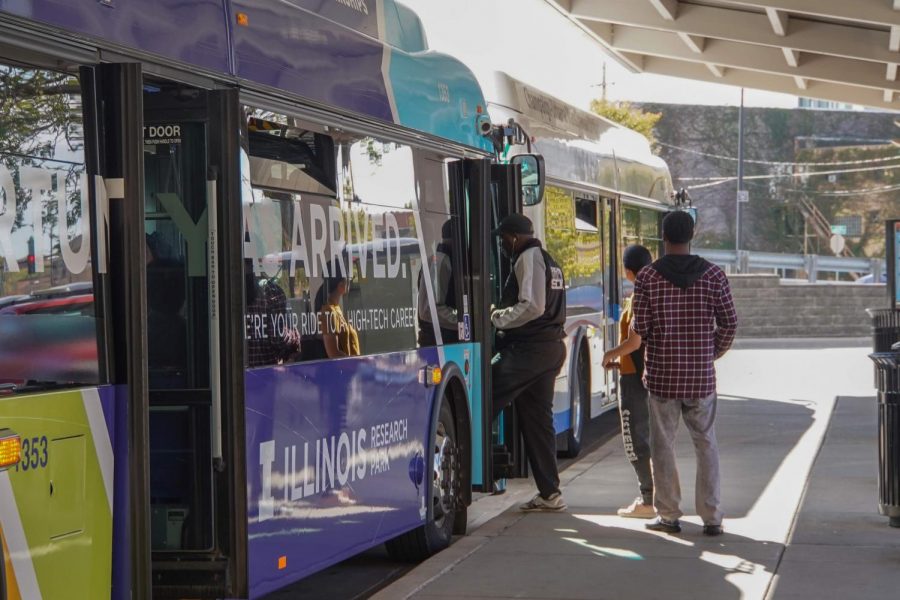MTD responds to COVID-19 with reduced ridership, increased sanitation
People step on an MTD bus at the Illinois terminal on Oct. 19, 2019.
Apr 24, 2020
With the spread of COVID-19 and the University campus shutting down, the Champaign-Urbana Mass Transit District is in reduced-service mode, running fewer trips per day and practicing new sanitation policies.
Prior to the stay-at-home order, MTD had an average of 58,000 trips per weekday, according to Amy Snyder, chief of staff at CUMTD. Now, MTD sees an average of 6,500 trips per weekday.
MTD has developed new procedures for disinfecting, including having bus operators wait at major transfer points and quickly get on the bus to disinfect with a medical-grade cleaner.
“We’re calling them ‘pit crews,’ like in an Indie 500 race,” said Karl Gnadt, managing director of CUMTD.
The pit crews use a sprayer with a static electric charge, allowing it to adhere to crevices in order to sanitize the vehicles and high-touch surfaces, such as stanchions and door handles. Every bus is sanitized twice a week; vans are sanitized every day.
Get The Daily Illini in your inbox!
MTD has a rear-door only boarding policy, but if the passengers need to use the kneeler or the ramp, they’re able to use the front of the bus. MTD began allowing people to ride for free on March 17 in order to eliminate the exchange of cash and coin transfers.
As the elimination of fare enforcement is for the protection of operators and passengers, “It certainly is a contradiction of, how do you keep people from joyriding?” Snyder said.
As far as essential travel goes, “the population that we’re struggling with the most is persons who don’t have a place to shelter,” Snyder said.
However, MTD is working to discourage ridership. The buses have interior signs explaining health recommendations, social distancing and essential travel policies.
Bus drivers have also been taking extra precautions. In addition to wearing cloth masks, drivers also have increased availability of hand sanitizer.
“We really wanted to make hand sanitizer available to the front-line employees who don’t have ready access to soap and water,” Snyder said.
Gnadt believes that the biggest challenge for MTD as a result of the pandemic is yet to come.
“The shutdown of all of the business activity in our economy has just killed the sales tax collection,” Gnadt says.
Much of MTD’s funding comes from the sales tax, and Gnadt anticipates dealing with the repercussions of those losses for years.
MTD is in the process of applying for funding from the Coronavirus Aid, Relief and Economic Security Act, according to Gnadt. As for the future, Gnadt sees many sanitation policies being carried over post-pandemic.
“I think that for public transit to remain a viable option to people, we need to continue to do everything we can to keep it sanitary,” Gnadt said.
Chuck Simpson, a bus driver for MTD, has been wearing a mask and using hand sanitizer frequently during his routes.
“I feel pretty good driving a bus,” Simpson said. “I know MTD is doing a great job with going above and beyond the cleaning practices.”
Simpson does not have any concerns about driving during the pandemic and is excited to chat with riders he has gotten to know over the last several months.
“Hopefully this gets over soon and we can all get back and I can see all my buddies again,” Simpson said.






